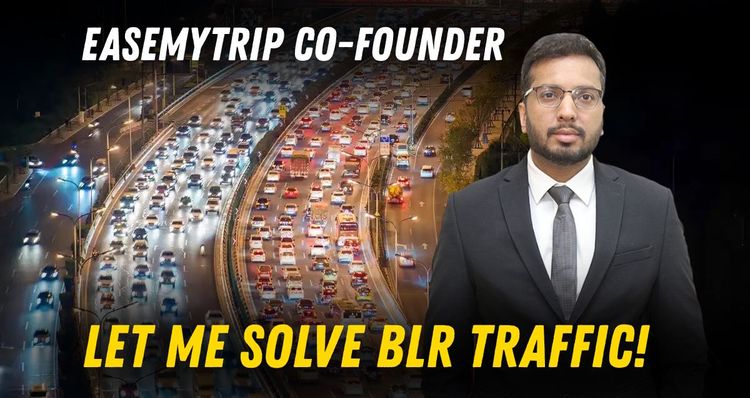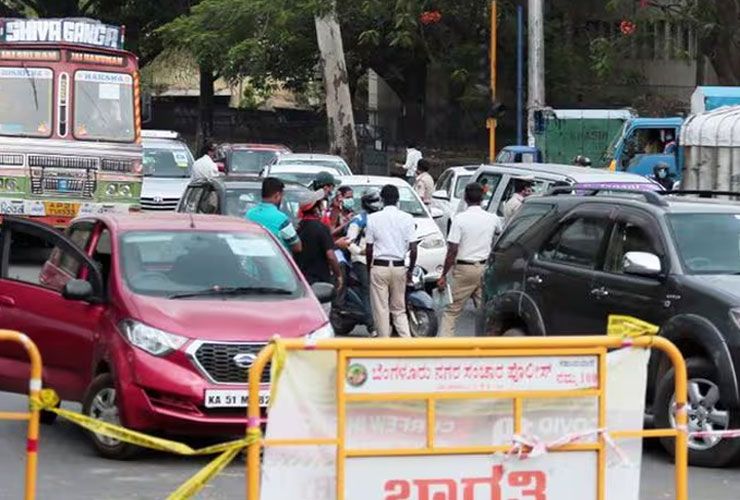Easemytrip Co-Founder Prashant Pitti Pledges ₹1 Crore to Solve Bengaluru Traffic Crisis



When Easemytrip co-founder Prashant Pitti found himself crawling through Bengaluru traffic at 5 kmph for over two hours just to cover 11 kilometres, he decided to do something more than just complain. The entrepreneur, known for shaking up the online travel booking space, pledged ₹1 crore of his personal money to solve what he calls one of the city's most pressing problems: traffic congestion.
But this wasn’t a social media stunt or a charity drive. Pitti has proposed a real solution backed by artificial intelligence, Google Maps traffic data, and satellite imagery. The bold idea is to redesign the city’s traffic flow using data science, offer it to the authorities free of charge, and prove that technology can do more than just navigate traffic, it can fix it.
It all started when Pitti, who splits his time between Delhi and Bengaluru, experienced firsthand the infamous gridlock that locals have long grown numb to. The sheer inefficiency of traffic management, signal timings, and road usage convinced him that a city known for its tech talent needed a smarter fix.
He decided to commit ₹1 crore to developing an AI-powered traffic optimisation model. The goal is to use real-time and historical data from traffic apps, satellite feeds, and road sensors to identify choke points, improve signal algorithms, and suggest low-cost interventions. Think of it as giving the city a data-driven traffic brain.
His public offer to donate this solution to the Bengaluru traffic police, no strings attached, was met with mixed reactions.
Not everyone is convinced. Bengaluru Traffic Police officials dismissed the move as “attention farming,” suggesting that the startup founder was chasing headlines rather than offering a viable fix. They claimed the city already uses Google data and is experimenting with AI-backed traffic signals.
But that argument doesn’t fully hold water. On-ground experience, as countless commuters will testify, doesn’t reflect any tangible improvement in traffic flow. If anything, peak-hour snarls are getting worse. Many traffic signals continue to operate on fixed timers, and coordination between signals across corridors is minimal.

Pitti’s proposal leans on proven concepts used in cities like Los Angeles, Singapore, and Amsterdam. These cities use real-time feedback loops, adaptive traffic signals, and predictive modelling to ease congestion. Bengaluru, despite being a global tech hub, has fallen behind in integrating such smart systems into its urban management.
What’s unique about this initiative is its grassroots spirit: a private citizen, fed up with poor systems, decides to fund a fix and give it away. If it works, the model could be scaled to other cities. And if the government refuses it outright, the public may demand answers.
Whether or not the traffic police accept the offer, Pitti has succeeded in drawing attention to a glaring problem. Bengaluru loses thousands of man-hours daily to traffic delays. Fuel wastage, stress, and lost productivity are silent drains on the city’s economy. Yet action from authorities has been piecemeal.
The ₹1 crore challenge might just be the push the city needs to start listening to its own tech ecosystem. Civic issues can’t always be solved by money, but sometimes, a bold challenge forces people to look harder at solutions they’ve ignored for years.
In the end, it’s less about one man’s money and more about showing what’s possible when frustration meets innovation.